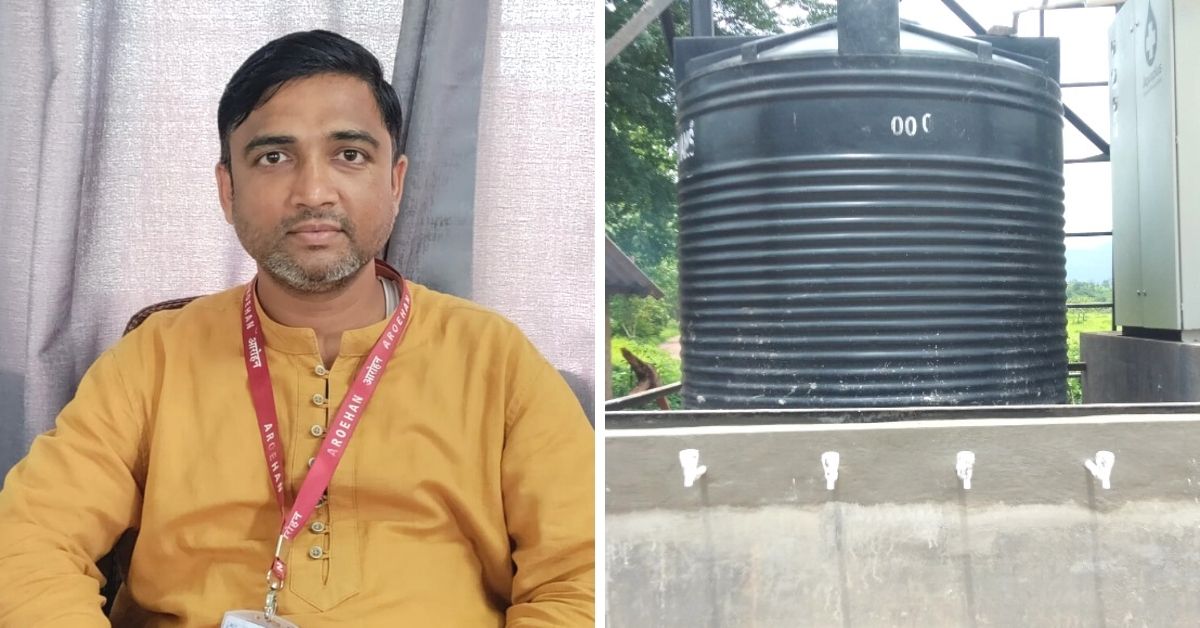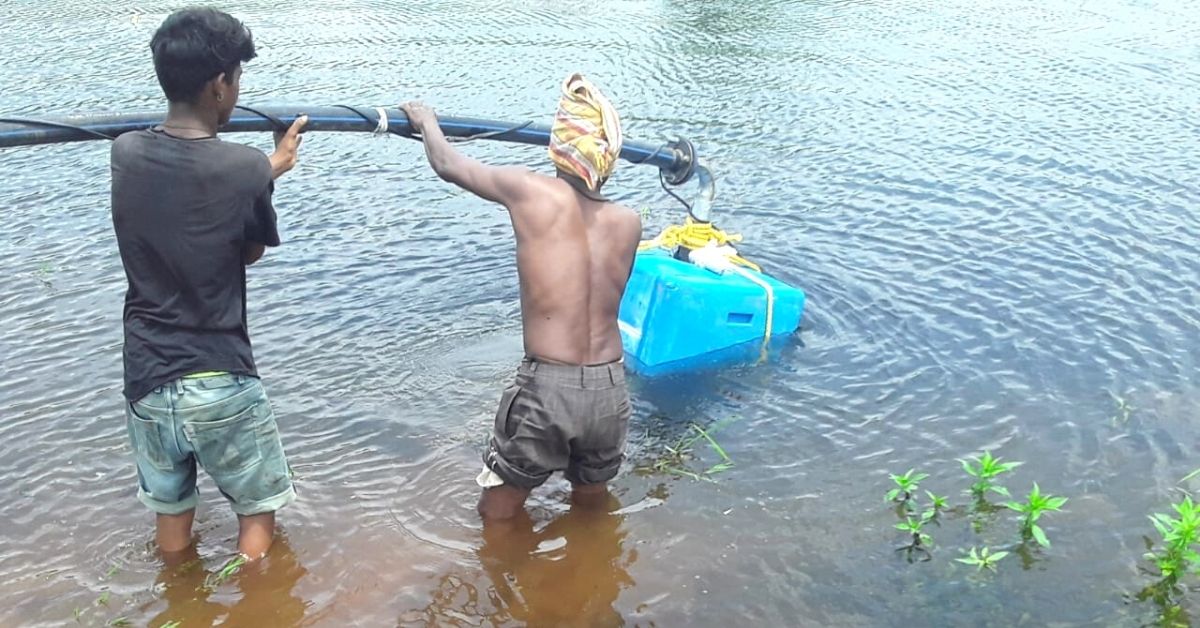How One NGO Provided 14,000 Farmers With Clean Water & Doubled Their Income
Nitesh Mukane, who works at Aroehan NGO, details how they have helped tribal villagers in Maharashtra by solving their water crisis, improving health among women and children and increasing farm income.

In 1995, Akkalkua and Taloda of Nandurbar district in Maharashtra reported over 12,000 infant deaths due to malnutrition. This prompted the College of Social Work, Mumbai — at the request of the then-Chief Secretary of the state Sri T K Shankaran, to undertake a project to intervene and resolve the crisis.
The college, through its field action project AROEHAN, resolved to understand the gravity of the issue, note the pain points and find solutions for the same.
Nitesh Mukane, then a student at the Jawhar College, became a part of the project to conduct a study in all the hamlets of the Mokhada taluka. “We conducted the study in 2000 to learn that poor water quality, its accessibility, health, education and livelihood were the concerns among the villagers,” he tells The Better India.
The field action project of the college continued till 2017; but the initiatives taken up by the project members continued under the auspices of AROEHAN, which was registered as an independent entity in 2014. Nitesh, who has worked with AROEHAN from 2006 till today, details how they have helped thousands of tribal villagers from Mokhada, Jawhar, Palghar, and Dahanu in Palghar district.
Their work in water conservation, health and nutrition and solar-based irrigation has benefited thousands over the years.
Doubling Farmer Income

Speaking about the solar water pumps, Nitesh says, “The village residents could not take on more than one crop due to poor rainfall and were unable to lift water due to water sources owing to poor electricity supply.”
He adds, “Moreover, the women travelled to far places to fetch drinking water. There was no provision to access clean water and remove pollutants. So we decided to identify a feasible solution for the same.”
They roped in a Pune-based startup Aquaplus Water Purifiers Private Limited, to source innovative filters that do not require electricity for the purifying process.
“We procured solar-powered water pumps to lift water from streams and other sources. The water was lifted and transferred to a tank placed at a common public space in the village. The water from the tank falls with gravity and passes through a filter that purifies water, which was accessed through a tap,” he explains.
Rahul Pathak, managing director of the startup, says, “The filters have a membrane of 0.01 microns and cleans water with the use of pressure generated by gravity. The tank is placed at least 10 feet above the ground to make it effective.”
Rahul explains that the membrane requires simple cleaning once a week. “The filters can purify 1,000 litres of water per hour, and cost Rs 85,000. They can last up to five years depending on the water quality. The cost to purify one litre of water is estimated to be Rs 0.2-0.3 paisa,” he adds.

Manisha Raut, a villager in Kumbhipada-Mokhada, says, “Women used to spend about 45 minutes fetching water from various ponds and water sources. We often took children along to assist, which enabled us to carry more quantities. But the polluted water also caused illness among children, especially during the monsoons.”
Manisha says installing the solar water pumps and filtration unit has reduced the time to 5-10 minutes for the task. “The children fall ill less frequently now,” she adds.
The 40 filtration units installed across various villages benefit 14,738 villagers ensuring a clean drinking water supply.
Apart from serving the drinking water needs, the solar water pump system irrigates the farms. He says, “In 2012, we started irrigation interventions to support seven farmers in 11 acres of land. Today, we are working with over 1,000 farmers.”
Baliram Pawar, a beneficiary farmer from Karoli-Mokhada, says, “I have about six acres of farmland, and I grow rice, ragi and little millets, thanks to the assured water supply through the solar water pumps. I use drip irrigation, mulching and other progressive farming techniques to improve the yield.”
He adds that the new arrangement helps farmers grow multiple crops like fruits, vegetables and millets twice a year.
Holistic Development
“Apart from solar water pumps, the NGO has helped to build barrages for water conservation and promote floriculture in the region,” he says, adding that such steps have helped double the income for the farmers.
Nitesh claims that the ‘lift water’ irrigation system has benefited 269 farmers covering 215 acres of land under irrigation. “Seventy-six other farmers are using a grid-based irrigation system,” he says.
Explaining the water conservation initiatives, he says that a study conducted by the Centre for Technology Alternatives for Rural Areas (CTARA) of IIT Bombay and commissioned by Siemens India Ltd and AROEHAN, revealed the various types of water scarcity in the Mokhada Block.
“With the data collected during the study, Aroehan built 196 small and medium-sized check dams, sub-surface bunds, cordons and loose boulder structures. We also repaired defunct wells and built new ones to recharge ground water that helped raise the water table,” he says.

He adds that the overall work conducted across 13 gram panchayats helped store 96 crore litres of water, raise groundwater tables and reduce the ‘thirst days’ of the villages.
Nitesh says that besides the water conservation work, about 4.5 lakh plants of mango, cashew, sapota, lemon, guava and jasmine have been planted, out of which 70 per cent survived.
Sharing the NGO’s work on improving the health issues of the villagers, Nitesh says that they started a health initiative programme called ‘Village Health, Nutrition and Sanitation Committees (VHNSC)’. “Over the years, various interventions have been made to address health issues among adolescents, reproductive health among pregnant and lactating mothers, early childhood care practices and community health monitoring such as preventing child marriage. The efforts have helped 15,000 pregnant and new mothers, and has benefited over 700 undernourished children in 45 villages,” he explains.
Sharing his learnings of working with the NGO, he adds that preserving traditional knowledge and protecting new systems is equally important.
“The ancestral resources and assets have helped the current generations survive, and it is important to protect them for the future. Moreover, the focus has to shift towards using renewable sources of energy for a sustainable lifestyle and to protect the environment,” Nitesh concludes.
Edited by Yoshita Rao
If you found our stories insightful, informative, or even just enjoyable, we invite you to consider making a voluntary payment to support the work we do at The Better India. Your contribution helps us continue producing quality content that educates, inspires, and drives positive change.
Choose one of the payment options below for your contribution-
By paying for the stories you value, you directly contribute to sustaining our efforts focused on making a difference in the world. Together, let’s ensure that impactful stories continue to be told and shared, enriching lives and communities alike.
Thank you for your support. Here are some frequently asked questions you might find helpful to know why you are contributing?


This story made me
-
97
-
121
-
89
-
167











